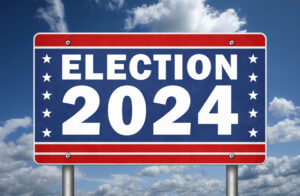Here I Am in London Again…
With Secrets of Direct Marketing and More Generalizations

I flew here from Poland on Monday to meet with some former business partners and colleagues and give the keynote presentation at Fix Fest, a seminar on copywriting produced by two friends and former mentees who’d topped off successful careers by starting an advertising agency in London.
The gestalt of the event was unlike any industry event I’ve produced or attended. It was promoted like a rock concert and held in a large crypt under an old church in midtown. The marketing was successful, as more than 200 people bought expensive tickets for the affair. They had a sort of soul choir singing while eventgoers paraded in. The room was festooned with banners and bows. They had mystery guests and snacks and surprise gifts. During the afternoon break, they had one of those poetry slams. And I was on the poster as one of the two “featured” speakers!
Apart from the promotional and presentational aspects of the show, Fix Fest was unusual in that its lineup of speakers included both notable direct response experts and experts from the brand marketing industry (the ad agencies that produce TV commercials and magazine ads).
That they put us together surprised me. There is a longstanding enmity between us. Copywriters from ad agencies consider themselves superior to us direct marketers because they work in nicer offices, and win awards, and have TV shows made about them. They also consider themselves superior to us because the sort of work they do tends to be clever and entertaining (think Super Bowl ads), whereas our work products are, in comparison, wordy and mundane.
This distinction was palpable in the first two presentations. The first speaker’s speech title was “Solitude,” and the content was something about finding your headlines by walking alone in the woods… or some such thing. The second speaker was even worse in that his entire presentation consisted of showing the audience his award-winning work, which was, to give credit where it’s due, impressively creative. But it was also almost absent of any actual selling of the product he was paid to sell. I don’t know how ad agencies get away with doing that – except that their customers (marketing executives that couldn’t sell a pizza to a hungry Roman) don’t realize that what they are paying for is nothing but a big fat ego trip.
At the end of this second presentation, the speaker gave the assembled audience (most of them from our industry) a list of “rules about copywriting that are wrong.” Rules like “long copy sells better than short copy” and “funny doesn’t work.” I recognized the list. It came from one of the books I wrote on copywriting. The bastard was launching a grenade!
When it was my turn to address the audience, I couldn’t resist taking a few pot shots at my ill-informed fellow speaker. I told them that getting prospects to laugh takes skill. Getting them to cry takes even more skill. But the greatest skill a copywriter can have is to get the prospect to respond to the ad by forking over his hard-earned money.
I tried to stop there, but I couldn’t help myself. The attendees had paid a lot of money to be there, and I felt that I had a moral obligation to set them straight. Also, I felt that my fellow speaker merited another salvo.
So I told them that the only selling that brand agencies know how to do is to sell a business on the idea that the money they are about to spend on a brand advertising campaign will be worth it. It’s almost never worth it, I said, but that doesn’t matter to the agencies. And the client, if he’s a good client, has a multimillion-dollar advertising budget and no way of measuring the success of the ad in dollars and cents. He wants to see it on TV. He wants his friends to talk about it.
I should have stopped there. But again, I couldn’t restrain myself. I told them that there are hundreds of direct response copywriters that make million-dollar yearly incomes. To make that kind of money in the agency marketing world, you’d have to own the agency, I said. And it would have to be an agency at the top of the heap.
That accomplished, I moved on to other topics, such as how the industry has changed in the last 40 years and why they would probably be replaced by AI in the next five years.
The crowd seemed to enjoy it. But I was told afterwards that my microphone wasn’t working and nobody could understand a word I said. Never mind. Pearls before swine.
So… what about London? After my observations about the Poles in my last two posts, what can I tell you about the Brits?
I’ve been to London dozens of times, but I was never a big fan. I understood the touristy attractions – the Crown Jewels and the changing of the guard and all that. But I always found London a little depressing. Londoners lack the charm of the denizens of Rome, Barcelona, and Lisbon. They also lack the je ne sais quoi of Parisians.
And the city itself, for all its attractive Victorian buildings, is noisy and dirty. Like New York.
And like New Yorkers, Londoners – at least the upper crust – feel superior to Americans. Not in the French or Polish or Chinese way. (People of those cultures are superior.) But in the Big Apple “We are the center of the universe” way. Plus, they drink an unbelievable amount of beer almost every evening after work. And they may be the most boisterous and pugnacious people in the entire world.
That said, they are loads of fun. (Though their sense of humor is absolutely impossible to understand.) And very accepting of you if you can stand up to them while draining down pint after pint of pilsner at a local pub.
And, of course, they have crappy weather. Which probably explains most of the criticisms I’ve just made.
To be fair, these aren’t my true feelings about the Brits. They are simply semi-serious generalizations. London’s denizens are, at some core level, just like us, their cousins across the pond. The good and the bad.
I’m writing this as I sit outside an elegant little bistro called Stoles Kitchen and Bar, served by an attentive and completely adorable young woman named Eliza, who speaks with the same cockney accent as Eliza Doolittle, but who, to her great benefit, has no idea who Eliza Doolittle is.
As I’m writing this, a man, about 50, walks by. He’s scrappy – almost homeless looking, but handsome in a crusty, weathered way. He passes and then returns to tell me how much he likes the aroma of the cigar I’m smoking. He says he could tell it’s a good cigar. “Is it a Chiba?” He asks. I tell him no, it’s not a Chiba. And that I stopped smoking Cuban cigars when I realized that every other one was “shit.” (The Brits are very fond of saying “shit” and “fuck.” I don’t know why.)
We fall into a lighthearted debate about cigars, and then I offer him one of the cigars I’m smoking, a Nicaraguan Padron Anniversario. “This is the best cigar in the world,” I tell him. He accepts it graciously. I cut it for him. He lights up. He’s smiling now. A smile that is genuine. This guy knows cigars. He shakes my hand. His grip is leather-wrapped steel. I ask him what he does for a living. He is a bricklayer. I ask him if he played a sport as a young man because I can feel that he did. He played rugby, he says. I tell him about my rugby experience playing for a French team in Chad. He tells me his best rugby story. We part as friends.
These things happen everywhere. But in New York and London, they happen all the time.
The steak is very good. And the wine, a Barolo, is as good as any I have had in Piedmont. And the prices, for the wine and the steak, are less expensive than K and I were paying for similar dinners in Poland. Factor that against the current exchange rate, and I’ve nothing but the best things to say about these annoyingly familiar cousins of ours across the pond.











